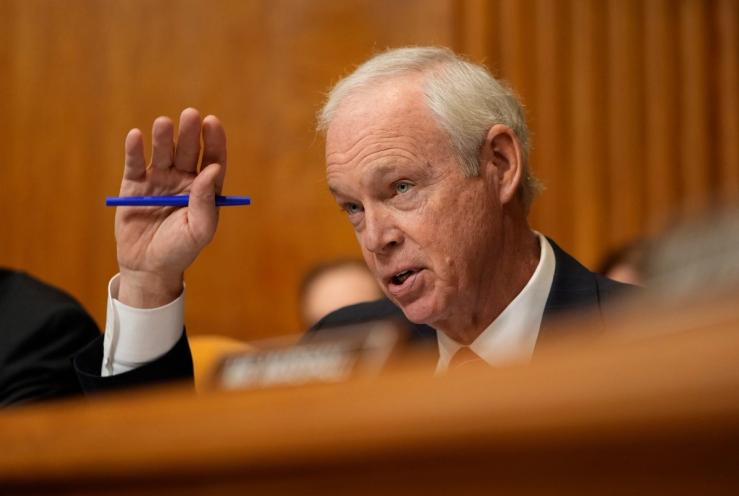The News
Senators are making noises about changing President Donald Trump’s sweeping tax and spending bill. Then there’s Ron Johnson.
The hard-charging Wisconsin Republican is leading a full-on assault on the House-passed bill’s deficit-expanding impacts, armed with charts, presentations to his colleagues, and a myriad of media appearances knocking the legislation. And if Johnson can’t support the legislation, it will further hamstring Republican leaders, who have already lost one senator’s vote in their 53-seat majority.
In several recent interviews, Johnson made clear he wants big changes but is trying to be reasonable. He accepts Republicans’ contention that expiring tax cut extensions do not need to be paid for and concedes it’s unlikely he’ll prevail in splitting the bill up into two pieces at this point.
But the man who nearly took a pass on running for a third term in 2022 has little to lose politically as he makes his push: He’s already served longer than he planned. And it’s clear he sees the fight in front of him as a legacy-maker for his career, which began with a shocking victory against a longtime Democratic senator.
“I ran in 2010 because I was panicked for this nation. I’m more panicked now,” Johnson told Semafor. “There’s a lot that I love about what President Trump’s doing. I’m a big supporter. I want to see him succeed. But right now, the ‘big, beautiful bill’? That’s just rhetoric. It’s completely false advertising. It’s literally divorced from reality.”
Summing up the growing deficit, he said: “We’re currently projecting $2.2 trillion. … Obama is under a trillion. Trump had increased it, Biden increased dramatically. Trump’s not doing anything to fix that.”
Johnson alone can’t sink the bill. But the situation echoes a similar problem Speaker Mike Johnson faced in the House: fiscal conservatives balking. Speaker Johnson won out by tweaking some of the bill’s dials; Sen. Johnson says he needs more than that.
And he isn’t alone in his criticism: Sens. Rand Paul, R-Ky., Mike Lee, R-Utah, and Rick Scott, R-Fla., oppose the House legislation and want bigger deficit reductions. There’s no question that Ron Johnson’s seen as the bill’s lead critic.
“Nobody should underestimate it. I mean, it’s not like Ron’s been shy about his position on this. And he’s been the conservative conscience of the chamber, certainly of the [Republican] conference,” said Sen. Kevin Cramer, R-N.D. “He’s serious. And we ought to take him seriously.”
GOP leaders say they are doing just that amid a careful balancing act. If Senate Majority Leader John Thune and his team pursue harsher austerity to win over conservatives, they risk alienating centrists.
Two GOP leadership aides expressed confidence they can get it done. One said Republicans are currently “drafting legislation that delivers on the Republican agenda and delivers 51 votes.”
“The Senate is going to work through its own processes and make changes along the way. Tax permanency and maximum savings are among the Senate’s top priorities,” said a second leadership aide. “Failure isn’t an option.”
In this article:
Know More
GOP leaders want to see action before the July 4 recess, and the pressure to support the legislation will start to build Monday and peak right before the holidays. Many Republicans concede the real deadline is later. Some think August is more realistic; Cramer suggested the end of the fiscal year — Sept. 30.
The legislation currently includes a lift to the debt ceiling, which could come up as soon as late summer. Johnson knows what the argument is going to be.
“They package everything into one big bill and: ‘You’re gonna allow us to default? You’re gonna allow a massive tax increase?’” Johnson said. “We’ve got a structural deficit of about 6%, the gap between revenue and spending. That’s probably gonna go to 7% with the big, beautiful bill. That is the wrong direction.”
Johnson’s record is filled with uphill fights. In 2017 he threatened to vote against the GOP’s Obamacare repeal bill but ultimately supported it. That same year, he took on the GOP’s tax cuts — using his early opposition as leverage to increase pro-business proposals in the bill, which he supported.
In 2021, a livid Johnson forced the Senate clerk to read the entire Democratic American Rescue Plan. After winning reelection in 2022, Johnson helped lead the opposition to the reelection of Mitch McConnell as the Senate Republican leader and backed Scott’s failed upstart bids.
In other words, Republicans are not writing off his words as just rhetoric.
“It’s really not that absurd what he’s suggesting. It’s just something that will take longer than between now and the Fourth of July,” Cramer said.
Burgess’s view
Johnson — or RonJohn — sees a chance to make a mark. After Paul, he appears to be the most likely GOP senator to vote no. He’s always been a loose cannon (particularly after winning reelection in 2016 with scant national support) and he’s a wealthy businessman who doesn’t need the job.
But Johnson is a lot more comfortable fighting with congressional leaders than he is with Trump, and there’s a decent chance Johnson is using his platform (he’s been all over the airwaves during the Memorial Day recess) to help shape the bill and get Trump’s attention.
Johnson was also one of the loudest critics of Trump’s tariffs. But when the Senate voted on canceling them, he sided with the president — who, to be fair, eventually watered down the levies.
Room for Disagreement
Sen. Lisa Murkowski, R-Alaska, told Semafor that while critics from the right are loudest, there are plenty of senators with more nuanced opinions.
“You have some people who come to the conversation with just a very principled view on spending and what we need to do with reductions in spending, and do it in an aggressive, aggressive way,” Murkowski said. “But you have others who are looking at it through perhaps a little different lens. And so how are we going to work it out? It’ll be much like the sausagemaking that went over on the House side.”


